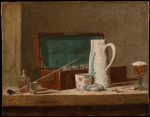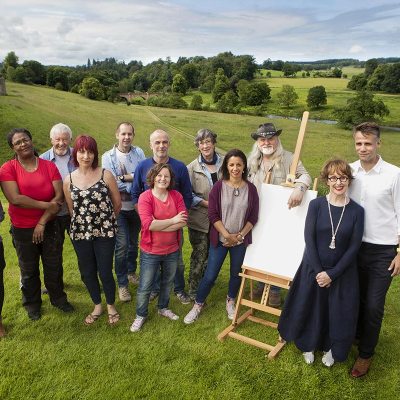‘The Simple Pleasures of Still Life’ is the final instalment of the ‘American Encounters’ series of exhibitions, a collaboration between the Louvre, the High Museum of Art, the Crystal Bridges Museum of American Art and the Terra Foundation for American Art. It is a small exhibition of 10 paintings tucked away at the far end of the Denon wing, but worth the detour for an insight into how the genre of still life has developed across the pond.
Two of the Louvre’s paintings, Chardin’s La Tabagie and Abraham Mignon’s Fleurs dans une carafe de cristal placée sur un piédestal en pierre avec libellule provide examples of the European still life tradition. The genre was slower to catch on in America, compared to landscape and portrait (both of which have been showcased in previous shows in the same series), but gained momentum throughout the 19th century.
The paintings of the earliest American still-life painters Raphaelle Peale and Joseph Biays Ord have a distinctly North American feel. Compared with Mignon’s voluptuous composition of exotic blooms, there is a calm serenity to Ord’s Still Life with Shells (1840). The pearly specimens are set against a backdrop of a Northern red oak, their shimmering surfaces reflected in a calm strip of water. Peale’s Corn and Canteloupe (1813) retains the simple pleasure of a Chardin, but with produce harvested in Peale’s native Maryland.
Still Life with Shells (Nature morte aux coquillages) (c. 1840), Joseph Biays Ord © High Museum of Art

Martin Johnson Heade’s Still Life with Apple Blossoms in a Nautilus Shell (1870) takes more from the tradition of the Dutch Golden Age. The illusionistic and virtuoso handling of flowers, fabrics, pearls and shell provides rich contrasts of surface and texture. The extravagant display of both natural and manufactured items hints at society’s increasing wealth and growing taste for luxury.
Small Change (Petite monnaie) (1887), John Haberle © Crystal Bridges Museum of American Art. Photography by Amon Carter Museum of American Art

In the latter half of the 19th century still-life artists were fond of trompe l’oeil effects, as represented here in works by De Scott Evans, John Haberle and George Cope. Haberle’s Small Change (1887), two worn bills and some coins on a rough wooden surface, is uncannily realistic. The artist signed the painting by way of a painted reproduction of a small tintype portrait. It is so convincing that it looks like a collage. Haberle produced several paintings in this vein. He was so skilful that he was suspected of counterfeiting money – and warned against it by the authorities.
‘American Encounters: The Simple Pleasures of Still Life’ is at the Louvre, Paris, until 27 April. It then tours to the Crystal Bridges Museum of American Art in Bentonville, Arkansas (16 May–14 September) and the High Museum of Art in Atlanta, Georgia (26 September, 2015–31 January, 2016).
Related Articles




